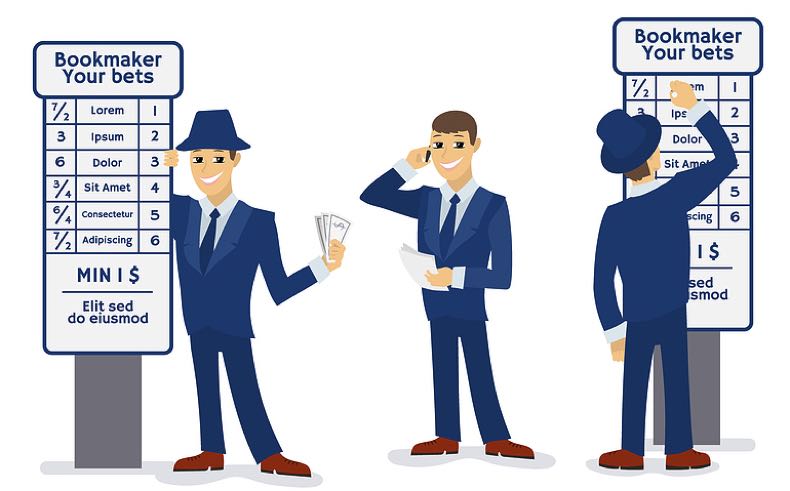 There are few urges which seem to be so ingrained in human nature as that of the desire to gamble. From our ancient ancestors fashioning primitive dice from the ankle bones of dead animals, to wagering on the chariot races of ancient Rome, and on to the saloon poker games of the Wild West, the seductive interplay of chance, risk and potential profit has always proven tough to resist.
There are few urges which seem to be so ingrained in human nature as that of the desire to gamble. From our ancient ancestors fashioning primitive dice from the ankle bones of dead animals, to wagering on the chariot races of ancient Rome, and on to the saloon poker games of the Wild West, the seductive interplay of chance, risk and potential profit has always proven tough to resist.
As the centuries have passed, gambling has endured in one form or another. But as with most things in life, the pastime has moved and adapted with the times. Whilst dice games remain, and play their part in lighting up Las Vegas, and poker games continue to run around the clock, one of the biggest boom areas in the “relatively” recent history of gambling has been that of sports betting.
Given the uncertain outcomes they provide and the passionate interest of spectators, it should come as no surprise that sport and betting go hand in hand. As mentioned, the Romans got their kicks from betting on chariot races and other events in the Colosseum over 1,000 years ago, and this relationship between competitive sporting action and the desire to place a bet is one that has only grown over time. However, at no point in history has this relationship exploded quite so spectacularly as it has in the years since 1960.
Here we chart the recent course of these gambling developments, from the opening up of the pastime to the masses to the biggest change of all, as gambling moved online. Finally, we will take a look at what the traditional betting shop punter can expect to find if opting to dip their toes into those online waters.
The Changing Face of Sports Betting
 Whilst these days we can of course bet on every sport under the sun, and can do so almost wherever and whenever we wish, it hasn’t always been this way. It is in fact only really over the past 60 years or so that gambling has begun to move into the mainstream. One of the key features, and perhaps the defining aspect, of this shift is the increasing accessibility of gambling, and the ease with which those so inclined can partake in a punt.
Whilst these days we can of course bet on every sport under the sun, and can do so almost wherever and whenever we wish, it hasn’t always been this way. It is in fact only really over the past 60 years or so that gambling has begun to move into the mainstream. One of the key features, and perhaps the defining aspect, of this shift is the increasing accessibility of gambling, and the ease with which those so inclined can partake in a punt.
One of the best ways to illustrate this gambling expansion comes through taking a look at how the world of horse racing betting has changed over the years. Let us first go back to 1960, a year that is likely to be before the time of many readers, but still relatively recent in modern history terms.
1853 Gambling Act
This writer wasn’t around six years prior to the English football team’s finest hour but is old enough to remember tales of his grandfather popping into the back alley in order to place an illegal punt on the 2:15 at Lingfield. And the reason for all of this sneaking around is that prior to the 1st May 1961 –and thanks to a gambling act passed way back in 1853 – it was illegal to place a bet anywhere other than at the race track. That fact of course greatly helped racecourse attendances but did come with the unwanted offshoot of the murky world of the backstreet bookmaker.
1960 Betting & Gaming Act
Then came the first big bang moment in the world of sports betting in the UK, the 1960 Betting and Gaming Act. Brought in by Harold McMillan’s government, this act took the huge step of legalising off-course betting shops. And in recognition of the underlying demand, it wasn’t long until these “betting offices” were popping up, whilst not quite on every street corner, not too far off it.
Access to gambling moved that bit closer to the punter, from having to get dressed up for a day at the races in order to place a legal bet, our intrepid gambler of yesteryear now merely needed to pop on his flat cap and head to the end of the street. The advent of the betting shop also signalled the moment at which betting on sports other than horse racing really began to grow, as betting shop operators began to provide odds on football, rugby, cricket, golf and more. That really was that for the pattern of betting in Britain. From the 1960’s onwards, the high street reigned supreme… and then came the internet.
World Wide Wagering
 It may be hard to believe these days, but there was in fact a time before the internet, and that time was before the 6th of August, 1991. For this was the day that the brainchild of Tim Berners-Lee first went live to the world, taking its first tentative steps towards revolutionising our lives.
It may be hard to believe these days, but there was in fact a time before the internet, and that time was before the 6th of August, 1991. For this was the day that the brainchild of Tim Berners-Lee first went live to the world, taking its first tentative steps towards revolutionising our lives.
In hindsight, it is no real surprise that one of the industries perhaps most affected by the explosion of the internet should be that of betting. However, in order for this new medium to be in a position to take advantage of the undoubted worldwide gambling demand, a few things first needed to happen.
Step 1: Licensing
One of the most important of these necessary developments concerned the issue of licensing. For whilst many betting operators around the world were no doubt eager to plunge into the waters of the world wide web, they did still have to do so legally. Step forward the Caribbean nation of Antigua and Barbuda, which in 1994 passed the Free Trade and Processing Act, effectively giving the government the power to grant licences to companies wishing to start online gambling operations.
Antigua and Barbuda thus became an early haven for online gambling firms, but other nations would swiftly follow, including the Kahnawake Gaming Commission in Canada, with the likes of Gibraltar, Malta and the Isle of Man coming later.
Step 2: Technology
The next crucial aspect of moving betting into the virtual sphere was, of course, the technology. It was all very well having a licence to run a site, but not much use if you don’t have the necessary software to do so. Helpfully, at around the same time that Antigua and Barbuda started issuing licences, a company by the name of Microgaming were beginning to find their stride on the Isle of Man.
Quickly rising to prominence in the provision of online betting and gaming software, the company still holds a lofty position in the industry to this day, with the likes of William Hill continuing to use Microgaming products.
With the licensing and software available, what was then needed was a fast, safe and secure facility enabling customers to deposit and withdraw funds to and from their betting accounts. Cryptologic were the pioneers in this field and by 1995 had developed a functioning solution to process customer transactions.
1996: Intercasino & Intertops
Now able to access a licence, gambling software and with the ability to process financial transactions securely, it wasn’t long at all until the first gambling sites began to emerge, with Intercasino becoming the first real money online casino in 1996, swiftly followed by Intertops – the worlds first sports betting website which also launched in 1996.
Intertops may not be the biggest name in the world of online betting but, in fairness to the company, they do still operate in 2021. Looking a little dated these days, and still absent from the UK market, that’s still a decent achievement considering the number of companies to have fallen by the wayside in the intervening years.
1997: Stan James
Where one goes, others will follow, and growth was pretty rapid in the early years, with 15 online betting sites recorded at the end of 1996, rising to 200 by the end of 1997. Spotting this potential and popularity it was only a matter of time before the big guns of the betting world gained a presence online, with the sadly now defunct Stan James becoming one of the earliest movers when launching an online arm in 1997.
A well-established and respected company, who were real pioneers of both telephone and in-play betting, the fact they are no longer in operation – ultimately being swallowed up by Unibet – is a prime example of just how rapidly the world of online bookmaking has grown and how competitive it has become.
2000: Ladbrokes, William Hill, Paddy Power & Betfair
The major high street firms weren’t quite as quick as Stan James and others in embracing the new technology, but as the popularity and turnover of online betting continued to grow, it became ever harder to ignore. The year 2000 then represented a real watershed moment for online bookmaking with Ladbrokes, William Hill and Paddy Power all launching their sites in this year, not to mention the emergence of Betfair which introduced the world to peer-to-peer or exchange betting – sparking something of a betting revolution of their own.
These early websites are certainly a far cry from the “all bells and whistles” creations of the modern era, but that was really only a product of the technology available at the time. Whatever their apparent limitations in hindsight, they certainly succeeded in attracting customers, which after all was their ultimate goal.
2015: Moving Away from the High Street to Online
So, how much of an effect did all of this have on the pattern of global gambling? This question is perhaps best answered by taking a look at the figures. Prior to the year 2000, online betting represented just 1% of the UK market. By the end of 2015, online turnover had overtaken that of the land-based betting shops, with the gap between the two only continuing to grow year after year.
Considering the UK betting industry alone is estimated to be worth in the region of £14.3 billion, and the fact that these sites attract customers from all over the world, that gives online betting a pretty big slice of a pretty big pie. But, why is it that punters appear to be moving away from the humble betting shop and towards online betting?
Why Is Betting Online So Popular?

The key and most obvious reason for the growth of betting online simply comes down to ease of access. From having to visit the racetrack to place a bet pre-1961, to frequenting the shop at the end of the street in the years thereafter, the modern gambler now doesn’t even need to leave the comfort of their own home in order to place a bet.
And even should our punting friend opt to venture out, there is still no necessity to visit a bookmaker’s premises; as thanks to the rapid development of mobile betting, anyone with a smartphone, i.e. just about everyone, now effectively has their very own betting shop conveniently located in their pocket.
Choice & Competition
Another factor that is likely to attract the modern-day punter online rather than to their nearest bricks and mortar operation is the sheer amount of choice and competition available in cyberspace. Competition is generally always a good thing for the consumer, and so it has proven in the online betting world, with companies offering all manner of sign-up offers, free bets, bonuses and loyalty schemes in a bid to attract new customers and stand out from the crowd.
Throw in the increasing popularity of Live or “In-Play” betting with its vast array of markets and rapidly changing odds – two features which are that much better suited to an online setup – and you have a product with which it is becoming increasingly difficult for the high street operators to compete. A situation which hasn’t been particularly helped by the changing trends and events of recent years.
Changing Trends on the High Street

The biggest development in high street betting shops in the past 20 years or so has been the explosion of the Fixed Odds Betting Terminal’s (FOBT). These electronic machines allow customers to play all manner of “fixed odds” casino and slot machine-style games – labelled as such as the odds on offer always remain the same, as opposed to those for traditional sporting events which fluctuate according to the amount of money taken.
FOBT Boom
First introduced in 2001, and designed to broaden the offering of the average high street bookmaker, the popularity of FOBT’s likely surpassed even the boldest predictions of the betting companies. The machines, driven by the hugely popular roulette product, proved to be a major boon to an industry seemingly under threat from the emerging face of online betting and were soon in place in shops up and down the land – with the major chains and smaller independents all wanting a piece of the action.
So successful were the FOBT’s that, not only did they help the traditional betting firms maintain their status quo, but they actually led to an expansion in the number of betting shops on our high streets. The chief driver behind this being a feature of the legislation which stipulated that no single shop was permitted to provide more than four FOBT’s. The obvious solution to this? Open more shops.
So the firms did, with a number of companies notably setting up premises large enough to contain the four FOBT machines, and little else besides. Cynical? Perhaps, but with each machine said to be bringing in an average of £50,000 per year in profit, you can hardly blame them. All told this process contributed to around a 50% expansion in the number of betting shops on British high streets between the years of 2004 and 2012.
All seemed rosy for the high street bookmakers, but over time, the firms did become increasingly reliant on the FOBT’s, and by the end of 2012 the profits from the machines had surpassed that made from bets taken over the counter for the first time. Nothing too concerning about that in and of itself, as trends and preferences can and do change over time. It did, however, leave the high street firms in a vulnerable situation should any new legislation regarding the machines come into play…
FOBT Bust
This is exactly what happened in 2019. From the moment they were introduced back in 2001, the FOBT machines had operated under legislation which capped the maximum prize at £500, and the maximum stake per bet – one spin of the roulette wheel for example – at £100. It is that latter rule which ultimately became the sticking point with anti-gambling campaigners and legislators.
Whilst bets much larger than £100 are taken over the counter in betting shops up and down the country, it is the speed with which customers are able to place a bet on the FOBT’s which proved to be the issue. Again, using roulette as an example, with each spin taking approximately 20 seconds, it was therefore possible for maximum staking customers to wager £300 every minute, or a whopping £18,000 over an hour of play – which even accounting for the fairly generous 97.2% return to player (RTP) of roulette, still equated to an average loss of £504 per hour. In the end, this level was deemed to be too high, and the decision was taken to reduce this maximum stake per bet, and dramatically so, from £100 all the way down to just £2.
High Street Shop Closures
Undoubtedly, this came as a hefty blow to the betting shop operators, and one which industry insiders predicted would lead to the closure of around one-third of the 8,500 betting shops in operation at the beginning of 2019 – leading to a new total of only around 5,700 shops on our high streets.
At the time of writing, however, that prediction has proven to be something of an exaggeration with 7,681 still in business at the end of 2020. That said, the negative predictions do continue to emanate from the betting companies, with both Ladbrokes/Coral and William Hill predicting the closure of hundreds of their shops by the end of 2021.
Whilst those shop closures are unfortunate, particularly due to the associated job losses of the staff involved, it is tough to say for certain that they all came directly as a result of the maximum stake reduction on the FOBT’s. The number of shops was in fact already declining prior to the implementation of that new maximum stake law, falling from 9,111 in 2014 to 8,559 in 2018.
2020 Didn’t Help Matters
We also have to consider the fact that 2020 wasn’t like any other year, with the forced closure of all betting shops – during what would have been some of the peak sporting and betting months of the year – also likely to have had a significant negative impact on high street betting shop business and related shop closures. The fact that customers were unable to access their local betting shop in order to place their bets during this period, can also only have acted as a catalyst in driving business online.
Many of these punters may never have considered online betting otherwise and may return once the shops reopen, whilst others may make the switch for good. It may take a little while yet for the dust to settle, enabling us to make a more accurate assessment of whether the shop closures came mainly as a result of the maximum stake changes, or other factors.
Of course for every winner, there is a loser, and as has been the general way of things during these changing times – be it in the world of department stores or fashion outlets – when it comes to betting shops, the high street’s loss has very much been to the gain of online businesses. For every pound lost in terms of high street spend, it seems another is staked online, and barring a further change in trend, this migration of bettors to the desktop, laptop, tablet and mobile device-led realm does seem set to continue. But what type of betting experience can these punters expect in comparison to that offered by the traditional betting shop? And what, if anything, is there for the online betting novice to be wary of?
How Does Betting Online Differ to the High Street?
 The first and most obvious difference between the two methods of placing a bet is, of course, the fact that one necessitates that you leave your house and travel to a betting shop, whilst the other can be done from the comfort of your own home, or in the case of mobile betting, from wherever you happen to be at the time.
The first and most obvious difference between the two methods of placing a bet is, of course, the fact that one necessitates that you leave your house and travel to a betting shop, whilst the other can be done from the comfort of your own home, or in the case of mobile betting, from wherever you happen to be at the time.
For some, that difference may count as a big win for online betting over the high street, but that view does perhaps overlook one of the main selling points of the high street betting shop, and a large part of the reason they continue to survive in the face of so much online competition.
That underestimated feature being the greater social interaction involved in mixing with the staff, regulars and friends down at your local establishment, as opposed to sitting alone in your pyjamas staring at an emotionless screen. And of course, requesting a free cup of tea from your PC will be met with only minimal response, whereas Deidre the cashier at the local Ladbrokes will always be only too happy to oblige.
For an increasing number of punters though, a free cuppa and a natter about the nags or the football is not enough to overcome the appeal of betting online. That being said, those looking to venture into betting in cyberspace for the first time do tend to have a few questions, with the following being some of the most common enquiries in our experience.
Can I Still Watch the Racing When I Bet Online?
A large part of the thrill in placing a bet comes in watching the action unfold live before your eyes, as your latest selection hurtles headlong towards riches or ruin. That may well be exaggerating the implications of the outcome of your £1 each way on Dastardly Dave, but whatever the stake, most punters do still want to see how their runner gets on. The modern online bookmaker knows a lot more about the appetites of punters than we do and unsurprisingly recognises this desire.
Whilst at most online firms the coverage isn’t quite so extensive as in a high street betting shop, where you are entitled to watch all of the races whether you have had a bet on them or not, the majority do still enable punters to watch any race they have placed a bet on. It doesn’t stop at horse racing either, with many of the top operators now providing extensive live streaming services covering a whole range of sport.
Are the Odds Online Better Or Worse?
If there is one area in which it is difficult to argue the merits of the high street bookmakers over their online competitors, then it may well be in terms of the odds available. In general, the odds online are simply better than those on offer in the high street shops, and the reason for this simply comes down to the greater levels of competition. With so many companies competing for business, online firms are forced to provide better prices in order to attract customers to their site.
This competitive environment creates an excellent situation for the customer. After all, online bettors aren’t restricted to having a betting account with just one firm, and can in fact sign up with as many as they like. Holding multiple betting accounts enables the modern-day punter to shop around and take advantage of the best price available for any given selection with just a few clicks.
Even for the loyalists who will, for example, bet with Ladbrokes and only with Ladbrokes, it isn’t unknown for the same company to offer a better price online than in its shops, with this discrepancy again being due to the sheer amount of competition, and lower overheads of online betting sites in comparison to the high street shops.
Can I Use a Quick Pick Coupon?
An oft-cited reason for resolute betting shop customers steering clear of betting online is the aspect of sticking to what they know, with many listing the simplicity of the quick slip type betting coupon as being a big selling point of the bricks and mortar operations. Traditionally used in football coupons, major horse racing events, such as the Grand National, and for numbers games, including the Irish Lottery, these slips are designed in such a way that the customer merely needs to mark a few boxes corresponding to their selections and stake and hand the slip to the cashier.
It is understandable that customers become attached to this way of betting, but it should be remembered that the vast majority of betting sites are designed with speed and ease of use in mind, and as such the manner of placing a bet online is often simply a virtual version of the quick slip. When looking to back a horse online, for example, the process usually involves simply clicking your selection, clicking whether you are backing to win or each way, entering your stake and clicking place bet. Pretty straightforward even for the uninitiated, and with the vast majority of firms offering best odds guaranteed these days, we don’t even need to worry about whether we should take a price or not.
Regarding the football coupons, many companies offer a digital version of the quick pick lists for the likes of the Weekend Accumulator and Both Teams to Score Bets which, in addition to being just as easy to fill in as their paper counterparts, come with the additional benefit of displaying the potential returns of the bet prior to placement, allowing bettors to adjust their stake, or add and remove selections with just a click or two.
What If I Need Some Help?
In our opinion, this is one area in which the traditional high street bookmakers do still hold the edge over their online counterparts. You can, by all means, receive help and assistance online with any betting-related queries you may have, with the majority of sites providing a live chat and/or telephone helpline service.
However, waiting times when using these facilities can vary from site to site and particularly during busy times of the day. This is not always an issue, but it can be, for example, if your query is regarding a race that is about to begin. It is much easier to simply ask the member of staff at the counter and receive the help you require immediately.
That said, as a customer becomes more familiar with betting online, any questions they may have should hopefully become less frequent, and for non-time-dependant queries, the live chat facilities, in particular, are usually able to resolve most issues.
Betting Shops: Declining But Not Dead… Yet

All in all the benefits of betting online seem to be outweighing those of the betting shop for the majority of punters, and especially so for the younger generations. It’s easy to see why this is the case, but for our money, there is still a place for both on the gambling landscape. There are after all no rules to state that you can’t place some bets online and others in a bricks and mortar operation.
That said, the shift in betting behaviour certainly shows no sign of turning around anytime soon, and if some forecasts are to be believed may be headed inexorably to a total shift to betting online. Whether that comes to pass remains to be seen, but betting in cold hard cash at the betting shop in the company of like-minded souls will always hold a certain romantic appeal for many, including ourselves; and Deirdre makes a cracking cup of tea!
